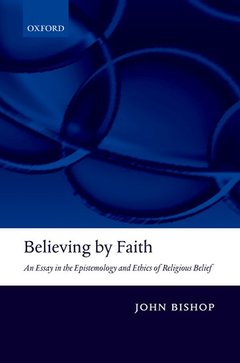Believing by Faith An Essay in the Epistemology and Ethics of Religious Belief
Langue : Anglais
Auteur : Bishop John

Can it be justifiable to commit oneself 'by faith' to a religious claim when its truth lacks adequate support from one's total available evidence? In Believing by Faith, John Bishop defends a version of fideism inspired by William James's 1896 lecture 'The Will to Believe'. By critiquing both 'isolationist' (Wittgensteinian) and Reformed epistemologies of religious belief, Bishop argues that anyone who accepts that our publicly available evidence is equally open to theistic and naturalist/atheistic interpretations will need to defend a modest fideist position. This modest fideism understands theistic commitment as involving 'doxastic venture' - practical commitment to propositions held to be true through 'passional' causes (causes other than the recognition of evidence of or for their truth). While Bishop argues that concern about the justifiability of religious doxastic venture is ultimately moral concern, he accepts that faith-ventures can be morally justifiable only if they are in accord with the proper exercise of our rational epistemic capacities. Legitimate faith-ventures may thus never be counter-evidential, and, furthermore, may be made supra-evidentially only when the truth of the faith-proposition concerned necessarily cannot be settled on the basis of evidence. Bishop extends this Jamesian account by requiring that justifiable faith-ventures should also be morally acceptable both in motivation and content. Hard-line evidentialists, however, insist that all religious faith-ventures are morally wrong. Bishop thus conducts an extended debate between fideists and hard-line evidentialists, arguing that neither side can succeed in establishing the irrationality of its opposition. He concludes by suggesting that fideism may nevertheless be morally preferable, as a less dogmatic, more self-accepting, even a more loving, position than its evidentialist rival.
Preface. 1. Introduction: towards an acceptable fideism. 2. The 'justifiability' of faith-beliefs: an ultimately moral issue. 3. The epistemic justifiability of faith-beliefs: an ambiguity thesis. 4. Responses to evidential ambiguity: isolationist and Reformed epistemologies. 5. Faith as doxastic venture. 6. Believing by faith: a Jamesian position. 7. Integrationist values: limiting permissible doxastic venture. 8. Arguments for supra-evidential fideism. 9. Conclusion: a moral preference for modest fideism?. Bibliography.
Debates in religious epistemology have grown stale and the dialectic predictable... Like all other areas in philosophy, it occasionally takes an iconoclast to shake things up and breathe new life into moribund debates with his recent book... Philosophers of religion doing work in religious epistemology... need to read Believing by Faith... I highly recommend this book
Date de parution : 04-2007
Ouvrage de 264 p.
16.3x24 cm
© 2024 LAVOISIER S.A.S.



